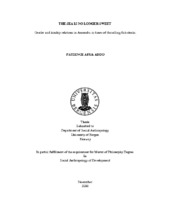| dc.description.abstract | Anomabu is a fishing community in the central regions of Ghana. In recent years, fisher families in this community have been experiencing dwindling fish stocks. Coupled with this is the fact that the seasons for fishing are also changing, and taken together, these factors are adversely affecting the main source of livelihood of the people of this community. This thesis uses ethnographic methods to explore the ways in which gender and kinship relations in Anomabu are undergoing change, and examines the significance of dwindling fish stocks for these changes. This line of enquiry is necessary because the fishing sector is very much gendered, in the sense that men go to sea while women process and sell the fish. The respective roles played by men and women in this sector affect how and to what extent they are able to access resources in the fishing sector. This study draws upon perspectives from gender and political ecology to examine the ways in which gender roles are naturalized and used to rationalize social behavior and organization. Various feminist scholars have showed that the various meanings given to gender, as well as the socio- economic institutions within which these meanings operate, goes a long way to influence the ways in which women are made subordinate to men. Perspectives from political ecology have also contributed to the analysis in this thesis of how power structures and dynamics within the Anomabu community influence access to resources within the fishing sector. Anomabu is a matrilineal society, but very patriarchal in how power is organized and distributed. Women in this community play important roles in the post-harvest sector of fishing occupation. This does not, however, translate into women having a greater say as to how resources in the sector are shared. Men are the ones who decide to a greater extent how resources are distributed in this community; often with the implication that women's labor and efforts are made less visible. Considering that most of the daily activities in this community revolve round the availability of fish, the thesis explores how changes in fish stock would affect gender and kinship relations. Evidence from the study shows that the fisher folks were concerned that the phenomenon of dwindling fish stocks was affecting their ability to live up to gender expectations and ideals. Evidence from the study also shows that the family as a social institution was undergoing some changes in the way in which it operates. There seems to be a shift from the communal way of living to a more individuated one. Fisher folks are now more concerned about taking care of the needs of their immediate family to the neglect of the larger extended family. | en_US |
